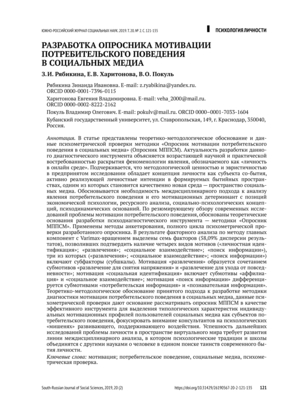Abstract
The paper contains theoretical and methodological substantiation, as well as the data of the psychometric validation of the technique called “Questionnaire on Consumer Behavior Motivation in Social Media” (MCBSM Questionnaire). The relevance of this diagnostic tool is accounted for by the growing theoretical and practical demand aimed at uncovering the gist of the phenomenon referred to as “personality in online environment”. It is emphasized that the concept of personality as a subject of co-existence is of special methodological and heuristic value. The personality implements its intentions in the developing existential spaces, one of which is a qualitatively new environment known as ‘social media space’. Convincing arguments are found to substantiate the necessity of interdisciplinary approach in analyzing customers’ behavior and their motivating determinants with resorting to economic psychology, resource analysis, social and psychological concepts and psychodynamic grounds. Having reviewed the latest researches in customers’ behavior motivation, the authors found strong theoretical arguments for developing a novel approach — a psycho-diagnostic tool called “MCBSM Questionnaire”. To draw it up, they used questioning and a full cycle of the Questionnaire psychometric testing. As a result of factor analysis by the method of the main components with Varimax-rotation, seven factors were identified (58.09% of the variance of the results), which allowed to confirm the presence of four types of motives (“personal identification”; “entertainment”; “social interaction”; “information search”), three of which (“entertainment”; “social interaction”; “information search”) include sub-factors (sub-scales). The motivation “entertainment” is formed by a combination of submotives “entertainment to relieve tension”; and “entertainment to escape from everyday life»; the motivation “social identification” includes the submotives “affiliation” and “social interaction”; the motivation “information search” is differentiated by the sub-motives “consumer information” and “cognitive information”. Theoretical and methodological substantiation of the adopted approach to the development of methods for the diagnosis of consumer behavior motivation in social media, as well as psychometric verification data give grounds to consider MCBSM Questionnaire as an effective tool for identifying typological characteristics of individual motivational profiles of social media users as subjects of consumer behavior, and to focus the attention of consultants on the psychological “targets” of developing, supporting impact. The success of further studies of personality in the space of the virtual world requires the development of interdisciplinary analysis approach, in which psychological traditions and schools will unite with other Sciences of Man in a common search for the mysteries of modern life of the individual.
Keywords
References
Андреева, Г.М. (2000). Психология социального познания. Москва: Аспект Пресс.
Богомолова, Е.И. (2014). Нарастающая виртуализация бытия и особенности личности, являющейся пользователем социальной сети. В З.И. Рябикина, В.В. Знакова Личностная идентичность: вызовы современности: материалы Всерос. психол. науч.-практ. конф. (c. 180–182). Краснодар: Кубанский гос. ун-т, Майкоп: Адыгейский гос. ун-т; М.: Институт психологии РАН.
Верховин, В.И. (2015). Экономическое поведение: учебное пособие: в 2 частях. Ч. 1. Москва: РУДН.
Гущина, Е.Г., Витальева, Е.М. (2012). Модели потребительского поведения индивида с точки зрения различных наук. Вестник АГТУ. Серия: Экономика, 2, 136–142.
Дейнека, О.С. (2000). Экономическая психология. Санкт-Петербург: изд-во С.-Петерб. ун-та.
Долгов, Ю.Н., Коповой, А.С., Малюченко, Г.Н., Смирнов, В.М. (2009). Развитие культуры медиапотребления: социально психологический подход. Саратов: Издательство Саратовского государственного университета имени Н.Г. Чернышевского.
Знаков, В.В., Рябикина, З.И. (2017). Психология человеческого бытия. Москва: Смысл.
Карпенко, Л.А. (сост.), Петровский, А.В., Ярошевский, М.Г. (ред.) (1998). Краткий психологический словарь. Ростов-на-Дону: ФЕНИКС.
Малюченко, Г.Н., Коповой, А.С. (2011). Теория и практика диагностики в медиапсихологии и медиапедагогике. Саратов: Изд-во Сарат. ун-та.
Манн, И., Поминова, Н. (2014). Точки контакт онлайн. Москва: СилаУма-Паблишер.
Окорокова, О.В. (2006). Анализ детерминант потребительского поведения в социально-экономических исследованиях. Научная мысль Кавказа, доп. вып., 38–49,
Покуль, В.О. (2013). Анализ сущности и структуры социальных медиа как инновационной среды в маркетинге. В Организационная среда XXI века: статьи и доклады IV Международной научно-практической конференции. Москва: МЭСИ.
Покуль, В.О. (2013). Мотивационно-личностные детерминанты поведения потребителей в социальных медиа. Вестник Адыгейского государственного университета. Серия 3: Педагогика и психология, 4 (129), 143–150.
Покуль, В.О. (2018). Поведение потребителей как объект междисциплинарных исследований: обзор научных взглядов и концепций. Человек. Сообщество. Управление, 1, 117–127.
Посыпанова, О.С. (2012). Экономическая психология: психологические аспекты поведения потребителей. Калуга: Изд-во КГУ им. К.Э. Циолковского.
Ричи, Ш., Мартин, П. (2004). Управление мотивацией. Москва: ЮНИТИ-ДАНА.
Сиврикова, Н.В., Жеребкина, В.Ф., Постникова, М.И. (2017). Взаимосвязь проявлений внутриличностного конфликта и стиля медиапотребления студентов. Российский психологический журнал, 3, 70–87.
Balick, A. (2013). The Real Motivation Behind Social Networking. Therapeutic Innovations in Light of Technology, 3 (2). Retrieved from https://www.academia.edu/2494977/The_Real_Motivation_Behind_Social_Networking._Therapeutic_Innovations_in_Light_of_Technology_Volume_3_Issue_2_
Balick, A. (2012). TMI in the Transference LOL: Psychoanalytic Reflections on Google, Social Networking, and Virtual Impingement. Psychoanalysis. Culture and Society, 17 (2), 120–136.
Buffardi, L., Campbell W. (2008). Narcissism and Social Networking Web Sites. Personality and Social Psychology Bulletin, 34, 1303–1314.
Burns, M. (2012) The State of Customer Experience. Retrieved from http://www.lithium.com/resources/analyst-reports/the-state-of-customer-experience‑2012
Hay, K. (2013) The Age of Narcissism and Homogenization with Instagram. Adore Noir, 12, 20–26.
Hoffman, D.L., Novak, T.P. (1996). Marketing in Hypermedia Computer-Mediated Environments: Conceptual foundations. Journal of Marketing, 60 (3). 50–68.
Kemp S. (2018). Digital in 2018. Essential Insights into Internet, Social Media, Mobile, and Ecommerce Use Around the World. Retrieved from http://digitalreport. wearesocial.com/
Kruglanski, A., Higgins, E.T. (Eds.) (2007) Social Psychology: Handbook of Basic Principles. New York, NY: Guilford.
Muntinga, D., Moorman, M. (2011). Introducing COBRAs. International Journal of Advertising, 30 (1), 13–46. DOI: 10.2501/IJA‑30–1–013–046
Pokul V. O, Voronina L. A, Malkova E.M. (2018). Content Generation in Social Media Based on Consumer Behavior. European Research Studies Journal, 9 (2), 923–935.
Pokul, V. (2012). The Role of Psychological Aspects of Motivation in Social Media for Integrated Marketing Communications. In Materials of XX International Conference “Management — New Challenges” (pp. 112–116). Lublin.
Schaefer, C. (2008). Motivations and Usage Patterns on Social Network Sites. In Proceedings of the 16th European Conference on Information Systems (ECIS). Galway, Ireland.
Shiri, D. Vivek, Sharon E. Beatty, Robert M. Morgan. (2012). Customer Engagement: Exploring Customer Relationships Beyond Purchase. The Journal of Marketing Theory and Practice, 20 (2), 127–145.
Shu-Chuan Chu, Kim Y. (2011) Determinants of Consumer Engagement in Electronic Word-of-Mouth (eWOM) in Social Networking Sites. International Journal of Advertising, 30 (1), 47–75.


